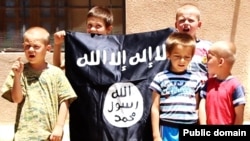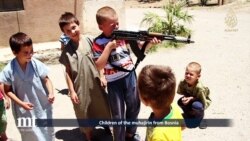Editor's note: VOA's Jeff Swicord visited Bosnia and Herzegovina and Kosovo to examine radical extremism in the Balkans. This is the first of three parts.
As the camera pans across a group of Bosnian children holding an Islamic State flag, they chant greetings to IS leader Abu Bakar Al-Baghdadi. Boys under the age of 10, many with blond hair and European features, then offer "the crusaders of America" a warning: "Your grave will be in Syria."
The video is one of many "Mujatweets" – slickly produced clips published by the Islamic State’s media operation. This one targets the Balkans.
Across the Balkan region, security officials say there is a war on for hearts and minds, and children are often the targets.
"Right now, we are in the phase where we have to fight for the [computer] chips inside their heads," says Vjekoslav Vukovic, the deputy security minister for terrorism in Bosnia and Herzegovina. "This is ideology, radical ideology, that is very present right now."
Hundreds of citizens – mainly from Bosnia and Kosovo, a few from Serbia, Macedonia and Albania – have gone to fight in Syria.
There are no set answers to why Balkan citizens are lured to radical Islamist ideology, but there are some common themes. Many blame the region’s dysfunctional politics and post-war economic deterioration.
In Bosnia, the unemployment rate for the 15- to 24-year-old demographic is 63 percent – the highest in the world. In Kosovo, it is around 30 percent. The result is an overall feeling of disenfranchisement and helplessness.
"Unfortunately, we are living in a society that is failing," says a Sarajevo University political science professor and author who writes about terrorism, Vlado Azinovic. "The set of common universally accepted ethical, moral – social values that existed before the war has crumbled and nothing else has emerged in the aftermath of the war."
Azinovic says radical Islamist ideology often fills the vacuum. Many who have gone to Syria to fight come from broken homes with little or no parental guidance.
"So, very often they rely on individuals who claim they are religious leaders and they can explain the complexities of the world and their place in that particular world," he says. "And of course they can offer this very simplistic black and white world view that these guys are readily embracing."
A powerful message
The Islamic State’s well-versed media machine is spewing out this absolutism constantly. Its official sites are blocked, so the group uses search terms and hashtags to share its publicity information with would-be followers. It has a regular stream of highly produced videos, some shocking and violent. Others depicting the "romance" of the jihadi lifestyle are readily available for those who are looking.
A former member of the Bosnian Mujahedeen and al-Qaida, Aiman Dean, says 20 years ago, radicals spread their message face-to-face, often in small groups. The Internet has changed that.
"On the Web, I can invade the living rooms of thousands, possibly tens of thousands of people," he told VOA. "Then if they are curious enough they will go into the social media, including Twitter, basically. They will seek out people who are spreading the message, and the recruitment and the radicalization will begin."
In the case of Husein Bosnic, the enticed didn’t have to look far. An imam who has been called the unofficial leader of the jihadi-minded Salifi community in Bosnia, he was recently sentenced to seven years in prison for "publicly inciting, recruiting people and organizing a terrorist group."
In lectures from his stronghold in the Bosnian mountains, posted on YouTube, he told followers that killing infidels, or non-Muslims, would absolve them from any previous sins.
At least six Bosnian citizens who attended his lectures are known to have died in Syria; others still remain there. The concern for security officials around the region is what happens when these fighters start returning home with military weapons and explosives training?
"My concern is what if they decide the jihad is now in Sarajevo, in Banja Luka or Mostar," said Vjekoslav Vukovic, Bosnia's deputy minister for security.
Fighting back
Communities around the region are starting to fight back against violent extremism.
In a classroom at the Bahri Haxha High School outside Pristina Kosovo, students are tested on how groups like IS and the al-Nusra Front recruit young people. Sitting in groups of eight around small tables with pads of paper and markers, they write down the arguments extremists might use to entice them.
Hovering around the tables is a team of facilitators from the Kosovar Center for Security Studies. "It is a regional problem, a regional threat and a regional challenge, said Skender Perteshi from KCSS, "and high school students are very vulnerable."
Each group of students brings a list of arguments to the front of the classroom and a discussion ensues. Perteshi and his staff throw out a counternarrative for each of the arguments the students have written down.
"The goal is to get them to think critically," he says. "Then we get them to talk about how to build a new strategy to address the phenomena."
Perteshi says the problem of extremism can only by solved by society as a whole – meaning government institutions, schools, NGO’s and, most importantly, the religious community must be marching to the same beat.
In Mitrovica, Kosovo, Imam Enis Mama has been fighting extremism for years.
He has talked several at-risk youth out of traveling to Syria. "There are many challenges for the youth here," he says. "There are not enough opportunities to keep them busy.
"And if there is no opportunity for them, then that energy will blow up somewhere."
The imam says a big part of countering extremism is deconstructing the militants' message.
"These are some guys that the only project they have in life is violence. They think that the only way to achieve anything is through violence," says Mama. He explains to young people that every human being has several projects in their life: "The first must be to rebuild and develop their own country, because every country has its own people and they have to do their part of the job."
Security officials whom VOA talked to admit the region has been slow to react, but they say they are moving forward.
Tuesday: How the 1990s Bosnian War helped create today's militant extremists.
Wednesday: A young Kosovar traveled to Syria to fight the Assad regime, but left disillusioned.









